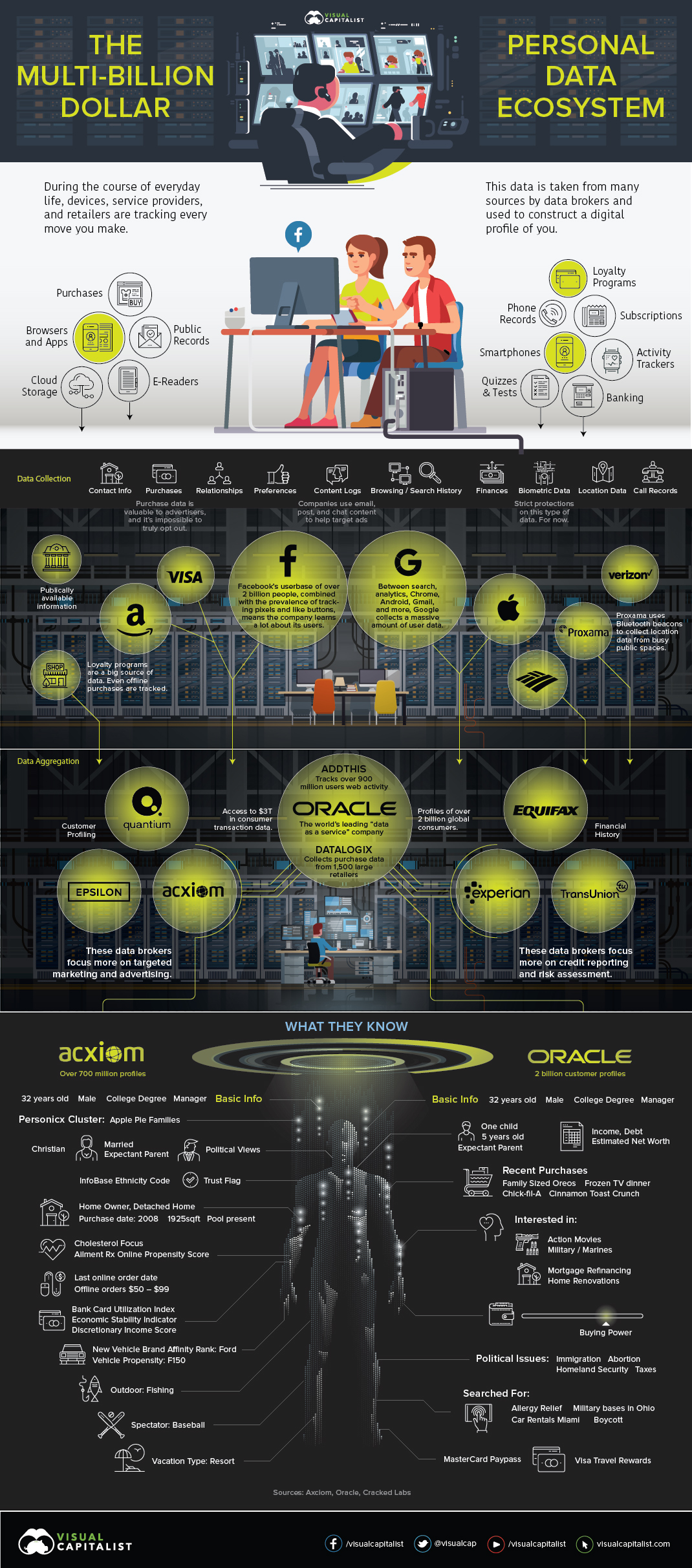The Multi-Billion Dollar Industry That Makes Its Living From Your Data by Visual Capitalist

In the ocean ecosystem, plankton is the raw material that fuels an entire food chain. These tiny organisms on their own aren’t that remarkable, but en masse, they have a huge impact on the world.
Here on dry land, the massive volume of content and meta data we produce fuels a marketing research industry that is worth nearly $50 billion. Every instant message, page click, and step you take now produces a data point that can be used to build a detailed profile of who you are.
EVERY BREATH YOU TAKE, EVERY MOVE YOU MAKE
The coarse-grained demographics and contact information of yesteryear seems quaint compared to today’s sophisticated data collection battleground. In the past, marketers would make judgement calls on your likely income and family structure based on where you lived, and you’d receive “targeted” mail and calls from telemarketers. Loyalty programs and the emergence of web analytics pushed things a little further.
Today, the steady march of technological advancement has created a vast data collection empire that measures every aspect of your digital life and, increasingly, your offline life as well. Facebook alone uses nearly one hundred data points to target ads to you – everything from your marital status to whether you’ve been on vacation lately or not. Telecoms have access to extremely detailed information on your location. Apple has biometric data.
Also watching your every move are web trackers. “Cookie-syncing” is one of the sneaky ways advertisers can follow you around the internet. Basically, cookie-syncing allows third parties to share browsing information at such a large scale that even the NSA “piggybacks” off them for surveillance purposes.
The recent sales growth of smart speakers will only increase the breadth of data companies collect and analyze. Amazon and Google have both filed patents for technology that would essentially allow them to mine audio recordings for keywords. Advertisers could potentially target you with diapers before your family and friends even know you’re expecting a baby.
FOLLOWING THE ONES AND ZEROS
While web trackers and companies like Apple and Google are collecting a lot of personal and behavioral data, it’s the whales of the data ecosystem – data brokers – who are creating increasingly detailed profiles on almost everyone.
Data brokers trade on the privacy of consumers and operate in the shadows.
The goal of data brokers, such as Experian or Acxiom, is to siphon up as much personal data as possible and apply it to profiles. This data comes from a wide variety of sources. Your purchases, financial history, internet activity, and even psychographic attributes are mixed with information from public records to create a robust dossier. Digital profiles are then sorted into one of thousands of categories to help optimize advertising efforts.
FEAR THE SHADOW PROFILE?
According to Pew Research, 91% of Americans “agree” or “strongly agree” that people have lost control over how personal information is collected and used.
Though optimizing clickthroughs is a big business, companies are increasingly moving beyond advertising to extract value from their growing data pipeline. Amalgamated data is increasingly being viewed as a clever way to assess risk in the decision-making process (e.g. hiring, insurance, loan or housing applications), and the stakes for consumers are going up in the process.
For example, a man may feel comfortable sharing their HIV status on Grindr (for practical reasons), but may not want that information going to a third party. (Unfortunately, that really happened.)
In 2015, Facebook filed a patent for a service that would help insurance companies vet people based on the credit ratings of their social network.
THE MORE YOU KNOW
Below the surface of our screens, our digital profiles continue to take shape.
Measures like adjusting website privacy controls and clearing cookies are a good start, but that’s only a fraction of the data companies are collecting. Not only do data brokers make it hard to officially opt out, their partnerships with corporations and advanced data collection methods cast such a wide net, that it’s almost impossible to exclude individual people.
Data brokers have operated with very little scrutiny or oversight, but that may be changing. Under intense public and governmental pressure, Facebook recently cut ties with data brokers. For a company that has bullishly pursued monetization of user data at every turn, the move is a sign that the public sentiment is changing.
Source: https://www.visualcapitalist.com/personal-data-ecosystem/
They profit by using our nature against us!